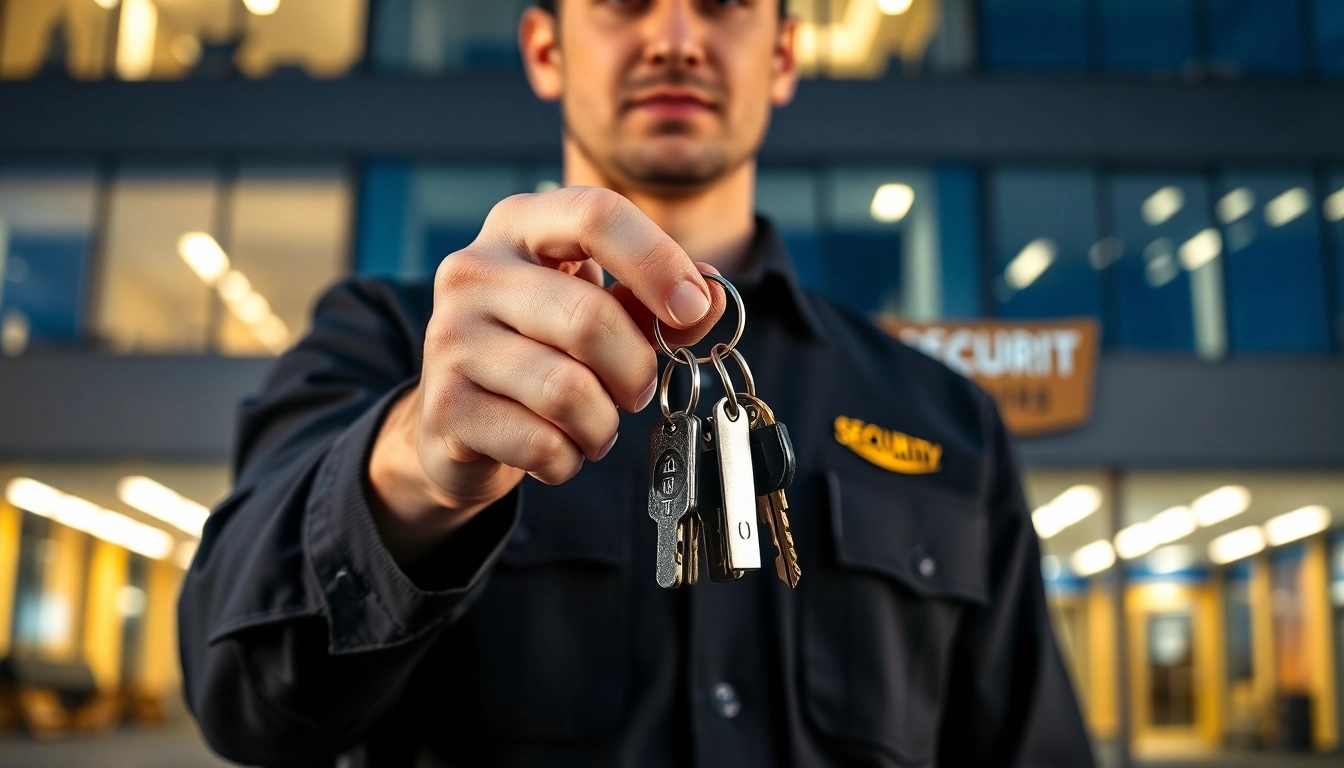What is Key Holding?
Definition and Overview of Key Holding
Key Holding is a professional security service where a third-party provider holds a set of keys for a business or property owner. In the event of an alarm activation or other emergency situations, the key holder can respond promptly without requiring the property owner to be present. This service is invaluable not only for businesses but also for residential clients who seek added security. During instances like these, having a trusted security provider can minimize risks and ensure the safety and integrity of the premises. For those interested in exploring comprehensive security solutions, understanding the nuances of Key Holding is essential.
The Importance of Key Holding in Security
The role of key holding in overall security strategies cannot be overstated. In an era where security threats are ever-evolving, businesses and property owners must adopt robust measures to safeguard their assets. Key holding services significantly enhance a property’s security posture by providing a rapid response mechanism. When an alarm is triggered, every moment counts; having a dedicated key holder ensures that trained professionals are available to attend to the situation without delay.
Moreover, the peace of mind that comes with knowing that your premises are monitored by a professional security team awakens a sense of security that allows business owners and residents to focus on their core activities without the constant worry of potential intrusions or security breaches. Key holding thus plays a pivotal role in the holistic management of security risks.
Key Holding vs. Traditional Security Services
When comparing key holding services to traditional security solutions, several key differences emerge. Traditional security typically involves physical policing (guards on-site), which can be resource-intensive and costly. These solutions offer visible deterrence but may not provide the immediate response required during an emergency scenario.
In contrast, key holding services combine flexibility and rapid reaction. While traditional security solutions might function well in preventing potential attacks, key holding addresses the aftermath, ensuring that when an incident occurs, there exists a reliable strategy for immediate action. Furthermore, key holders are often equipped with the training and tools needed to handle emergencies effectively, enhancing overall safety.
Benefits of Professional Key Holding Services
Rapid Response to Alarm Activations
The cornerstone of professional key holding services is their ability to respond swiftly to alarm activations. Alarm systems are often the first line of defense in securing a property, but the efficacy of these systems is contingent upon a timely response. Key holding professionals receive alerts directly from clients’ alarm systems, allowing them to act immediately, minimizing the potential for damage or loss. The rapid response of a trained professional can mean the difference between a minor incident and a major crisis.
This quick action not only serves to protect physical assets but also reassures tenants or employees who may be present. Knowing that a security team is ready to manage any situation can foster a safer working or living environment.
Reduced Liability for Businesses
Businesses today face numerous liabilities that can arise from security incidents, ranging from theft to damage during a break-in. By utilizing professional key holding services, companies can diminish their exposure in these risk areas. Key holders are trained not only to respond but also to assess security breaches. Their involvement allows business owners to establish a clear line of accountability and reduces the likelihood of internal theft or mismanagement of security protocols.
In the event of an incident, having documented responses and procedures in place can further protect businesses during insurance claims, demonstrating that appropriate measures were taken to safeguard assets.
Peace of Mind for Property Owners
For property owners, knowing that a professional key holder is safeguarding their home or business provides immense peace of mind. The reassurance that comes with knowing that authorized personnel can access the property at a moment’s notice is invaluable. This service alleviates the burden on property owners, who may otherwise need to appoint employees or family members to serve as emergency contacts—a role that can often be fraught with complications.
Furthermore, with key holding services, property owners create a reliable security plan that encompasses all aspects of property management, ensuring that they can respond to any situation effectively, without being tied down by the requirements of acting as their own key holder.
How Key Holding Works
The Process of Engaging Key Holding Services
Engaging a key holding service typically requires a few standard steps to ensure alignment between the provider and the client’s security needs. Initially, property owners should evaluate their requirements, identifying the key areas where they need support. After this, it’s essential to conduct thorough research and select a security provider that resonates with their specific needs.
The initial consultation often involves a security assessment, during which the service provider will identify vulnerabilities and suggest tailored solutions. Following this, an agreement is established that outlines responsibilities, response times, and the fees associated with the key holding service.
Key Management Protocols
Once a service is engaged, the management of keys is a central component of the key holding process. Professional key holding services implement strict protocols for securing and managing keys. Each key is often labeled discreetly to maintain confidentiality while simultaneously tracking its usage effectively.
Logs are maintained to monitor who accesses the keys, when, and for what purpose. This meticulous approach ensures transparency and accountability, bolstering security protocols significantly. Additionally, regular audits of key access help to identify any inconsistencies or potential security gaps, allowing for timely interventions.
Communication and Coordination
Effective communication is crucial in any security service operation, and key holding is no different. Clients should establish clear communication channels with their key holding provider. This includes emergency contact details, preferences for response actions, and any specific instructions related to the property.
Regular updates and coordination meetings—often monthly or quarterly—can enhance the relationship between the client and the security provider. This ensures that both parties are aligned on any ongoing issues or adjustments that may arise due to changing needs or circumstances.
Choosing the Right Key Holding Provider
Essential Criteria for Selection
Choosing the right key holding provider involves considering several vital criteria. First and foremost is the provider’s licensing and accreditation—check that they meet all legal requirements to operate in your area. Customer reviews and testimonials provide insights into the quality of service, giving prospective clients a gauge of the provider’s reputation in the market.
Furthermore, examining the provider’s response time policies, their operational protocols, and whether they have insurance coverage can form part of a comprehensive assessment process. Clients should also ask about staff training, emphasizing the importance of having trained professionals who understand emergency response protocols effectively.
Questions to Ask Potential Providers
When reviewing key holding providers, property owners should ensure they ask the right questions to ascertain effectiveness and reliability. Some recommended inquiries include:
- What is your average response time to an alarm activation?
- Can you provide client references?
- How do you manage key security and access?
- What training do your staff receive regarding emergency procedures?
- Do you have insurance coverage, and what does it entail?
These questions will help clarify the capabilities of the key holding service, ensuring a good fit with the client’s needs.
Evaluating Security Credentials and Certifications
When selecting a key holding provider, evaluating their security credentials and certifications is critical. These indicators not only demonstrate professionalism but also reflect the provider’s commitment to maintaining high-security standards. Look for certifications from recognized security associations, as these often require rigorous training and adherence to established industry guidelines.
Additionally, consider requesting documentation proving their compliance with local laws and regulations regarding security practices. This validation reinforces confidence in the provider’s ability to manage sensitive responsibilities appropriately.
Best Practices for Effective Key Holding
Regular Updates and Reviews of Key Holding Procedures
To maintain an effective key holding service, regular review and updates of the holding procedures are fundamental. This process involves regularly assessing the property’s security measures, including the effectiveness of the key holding protocol in place. Security needs may evolve due to various internal and external factors, such as changes in property ownership, asset value, or even local crime rates.
Conduct a systematic review at least annually to adjust your security plan and key holding requirements accordingly. Implementing feedback mechanisms where key holders can suggest improvements can also be beneficial in enhancing the overall key holding process.
Integrating Key Holding with Overall Security Plan
Key holding services should not operate in a vacuum. They are most effective when integrated into the broader security strategy of a property. This means aligning key holding with surveillance systems, alarm technology, and on-site security measures. By ensuring comprehensive communication among these elements, property owners can create a cohesive strategy that enhances responsiveness to security threats.
Additionally, trained staff members should be aware of the key holding protocols as part of their orientation. When everyone involved understands their specific roles within the security framework, it leads to more effective handling of emergencies and contributes to the overall security culture of the organization.
Case Studies on Successful Key Holding Implementations
One of the best ways to illustrate the importance and effectiveness of key holding services is through real-world examples. Consider a case where a retail outlet experienced repeated instances of alarm activations due to false alarms stemming from faulty equipment. After engaging a professional key holding provider, a thorough assessment led to equipment upgrades and more precise monitoring protocols.
Within months, the store saw a significant decrease in false activation incidents, resulting in reduced alarm response fees and increased overall satisfaction with the security system. The key holding service not only addressed the immediate alarm concerns but also contributed to a more robust security environment.
Such case studies reinforce the understanding that effective key holding services can lead to improved security outcomes, delivering substantive benefits to property owners and reinforcing the value of professional security partnerships.



